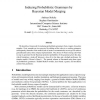Free Online Productivity Tools
i2Speak
i2Symbol
i2OCR
iTex2Img
iWeb2Print
iWeb2Shot
i2Type
iPdf2Split
iPdf2Merge
i2Bopomofo
i2Arabic
i2Style
i2Image
i2PDF
iLatex2Rtf
Sci2ools
114
click to vote
ICGI
1994
Springer
1994
Springer
Inducing Probabilistic Grammars by Bayesian Model Merging
We describe a framework for inducing probabilistic grammars from corpora of positive samples. First, samples are incorporated by adding ad-hoc rules to a working grammar; subsequently, elements of the model (such as states or nonterminals) are merged to achieve generalization and a more compact representation. The choice of what to merge and when to stop is governed by the Bayesian posterior probability of the grammar given the data, which formalizes a trade-off between a close fit to the data and a default preference for simpler models (`Occam's Razor'). The general scheme is illustrated using three types of probabilistic grammars: Hidden Markov models, class-based
Bayesian Posterior Probability | ICGI 1994 | Natural Language Processing | Probabilistic Grammars | Stochastic Context-free Grammars |
Related Content
| Added | 09 Aug 2010 |
| Updated | 09 Aug 2010 |
| Type | Conference |
| Year | 1994 |
| Where | ICGI |
| Authors | Andreas Stolcke, Stephen M. Omohundro |
Comments (0)

